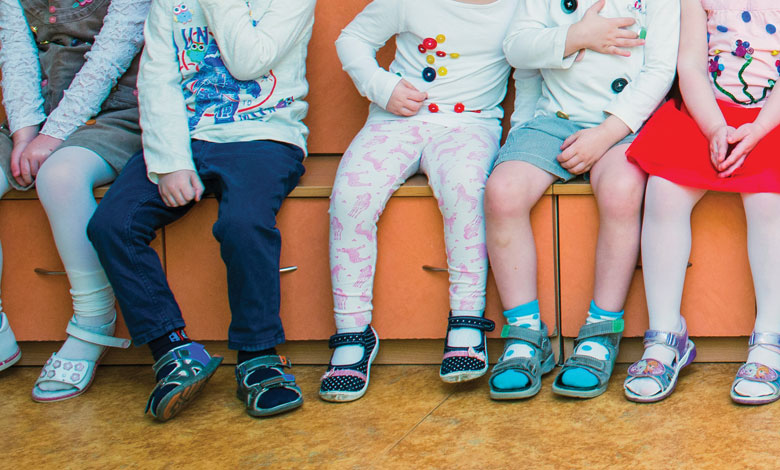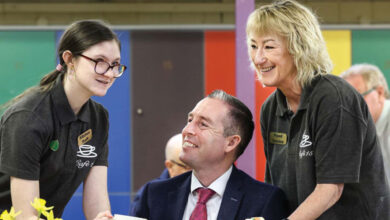Early intervention programme reform ‘resource dependent’

The Department of Education has welcomed the findings of an independent review which recommends significant reforms of its early years intervention programmes, but said that a forthcoming implementation plan will be “based on the budget available”.
No publication date has been outlined for the implementation plan, which the Department of Education says it will develop after consideration of the recommendations, alongside the Department of Health and other stakeholders.
The Review of Department of Education Targeted Early Years Interventions was published in December 2023, and forms part of the Department’s focus on early years support for disadvantaged children, as recommended by A Fair Start, the Executive-endorsed report and action plan on educational underachievement.
Commissioned to examine the efficiency of existing targeted intervention programmes such as Sure Start, the report outlines increasing levels of need and demand for the existing early intervention programmes, while also identifying gaps in the system and a need to support access for those who are most in need of the service.
While ultimately suggesting that existing programmes are retained and in some areas, expanded, the report’s recommendations do indicate the need for significant reforms to administrative and oversight structures.
Asked to outline the Department’s planned actions following the report’s publication, a spokesperson said: “The Department of Education welcomes the findings of the Independent Review of Department of Education Targeted Early Years Interventions. The Department of Education will work with the Department of Health and other stakeholders to consider the recommendations detailed within the report and develop an implementation plan based on the budget available.”
Although no implementation plan has yet been delivered, the expansion of the Department of Education’s early years intervention programmes is expected to form part of a £7 million investment announced by the Minister of Education.
The intervention is part of a wider £25 million package announced for early learning and childcare measures by Education Minister Paul Givan MLA in May 2024.
Although details of direct actions have yet to be finalised, an urgent written ministerial statement to the Northern Ireland Assembly by Givan outlined an investment of approximately £7.1 million, to enable “secure and expand core early years early years programmes”.
The Department’s early years interventions are centred on three core programmes in the form of Sure Start, Toybox and The Pathway Fund. Making reference to these programmes, the financial allocation also mentions “other” programmes, including those focused on supporting children with special educational need and disabilities.
Review of Department of Education Targeted Early Years Interventions
Sure Start was first introduced in 2000 by the then Department for Health, Social Services and Public Safety and there are 38 Sure Start projects across Northern Ireland. The Department for Education is responsible for the strategic development and policy of the Sure Start Programme, as well as the financial accountability. However, the administration of Sure Start and oversight of the Department of Education’s funding is the responsibility of the Strategic Planning and Performance Group (SPPG) in the Department of Health.
While the review recommends that Sure Start remains a Department of Education programme, it points to arrangements between the Department of Education and the Department of Health as “overly bureaucratic”, and suggests it should be simplified using mechanisms such as “technical transfers”.
“Most stakeholders and practitioners did not advocate for major changes to the fundamental structures that administer and oversee Sure Start. However, a number of reforms were described as necessary to reduce bureaucratic burdens, to improve streamlining, and to ensure effective use of resources,” it explains.
Amongst the tangible reforms suggested includes the creation of dual accountability for the ministers of both departments of Sure Start, which it is suggested could encourage a more proactive approach to its development and the management of resources.
In addition, the review suggests that “a lack of clarity between departments in the administration and oversight of Sure Start”, has been contributed to by a delay in agreeing on an updated memorandum of understanding (MoU) and documentation, to structure reporting arrangements and expectations, between the two departments and the SPPG.
Interestingly, the review recommends that Sure Start targeting continues to be based on the Northern Ireland Multiple Deprivation Measure (NIMDM) and continues to be aimed towards children who are most at risk of not meeting their development goals.
It adds: “There is a strong justification for the recent expansion of Sure Start, and it is a recommendation from this review that the 22 recently added areas continue to be retained within the programme.”
In the context of increased need and demand from both within and outside of Sure Start areas (most Sure Starts are already supporting a small proportion of children from outside of their area), the review reports a “need to address gaps in the system and support access”.
“Greater clarity was encouraged around what degree of flexibility is permitted to help support children and families in need of support but who live outside the Sure Start area,” it states.
Assessing the three Early Years programmes as serving sufficiently different purposes and specific needs, but functioning together with complementarity, the review recommends that all three programmes continue to operate and be supported.
“Given the increased need and demand experienced across the early years sector, the Pathway Fund and Toybox offer support in relation to both distinct groups, and by offering distinct services.”
Highlighting the wider benefits of funding beyond the development of individual children, the review highlights value of support staff retention in sectors such as the community and voluntary sectors, warning: “loss of funding would likely create significant challenges in retaining staff and would result in project closure and impact on other projects delivered by organisations in receipt of Pathway funding.”
A concluding recommendation relates to the Pathway programme helping to bridge demand gaps in areas where there is limited access to Sure Start.
“To reduce the potential for duplication Pathway funding may be targeted towards areas not covered by Sure Start. Given the lack of access to Sure Start in many areas, the Pathway Fund offers one mechanism to expand early years services. Pathway funded projects could be a venue for provision of satellite Sure Start services, however this would require further research and costing.”
|
Sure Start Sure Start is a programme for parents and children under the age of four and is targeted towards the 25 per cent most disadvantaged areas in Northern Ireland, through the Northern Ireland Multiple Deprivation Measure (NIMDM 2010). First introduced to Northern Ireland in 2000, its overarching aim is to improve language skills; identify developmental delay; enhance parenting skills; and improve access to services. There are 38 Sure Start projects across Northern Ireland. Toybox Introduced in 2003 to meet Traveller children’s need, it now provides support to Traveller and Roma children and their parents before, during, and after pre-school. The Pathway Fund Introduced in 2016, The Pathway Fund focuses on the provision of early years education and learning services for children aged up to four and is open to sessional day care providers, full day care providers and childminders. It funds a wide range of different projects across two funding streams, up to £15,000 and £30,000 respectively. |




